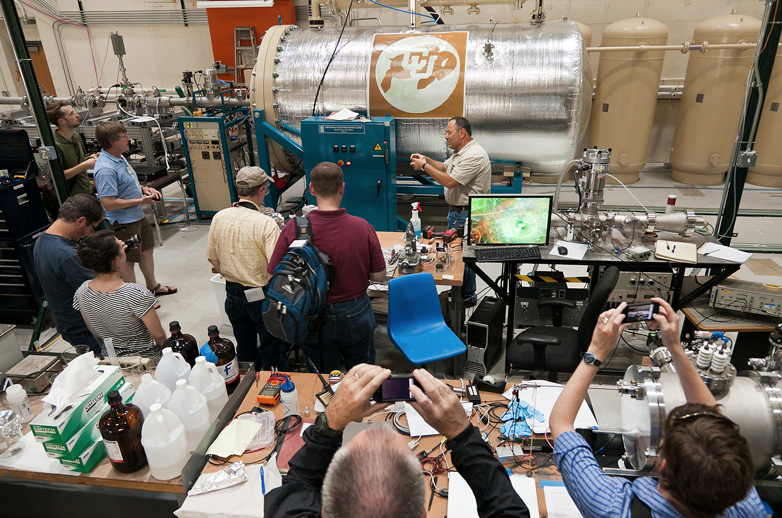New Media Workshops

CCLDAS Principal Investigator Mihály Horányi shows the LASP dust accelerator to a group of science communicators during the July 20-22, 2012 LASP New Media Professional Development Workshop. (Photo courtesy Kevin Baird)
LASP and CCLDAS offer professional development workshops for practitioners of New Media; our focus is on providing an introduction to particular fields of lunar science, and to the scientific process itself. These professional development workshops are designed to bring practitioners of New Media and scientists together for an intensive, two-way learning experience.
Target participants for our media workshops are those who use New Media—blogs, Twitter, Facebook, podcasts, video, online communities, etc.—to inform the general public about science and, in particular, space and atmospheric science. Our attendees may or may not have formal training in either journalism or science.
Past workshops
Future Exploration of the Moon and Small Bodies
July 20-22, 2012
Boulder, Colo.
Speakers:
- Dr. Ed Beshore: Deputy Principal Investigator for Osiris-REx; Lunar and Planetary Laboratory, University of Arizona
- Dr. Daniel Britt: co-investigator for Mars Pathfinder and Deep Space 1; Department of Physics, University of Central Florida
- Dr. Richard Dissly: Senior Manager, Science Business Development, Ball Aerospace & Technologies Corporation
- Dr. Mihály Horányi: PI for CCLDAS; LASP scientist; Department of Physics, University of Colorado Boulder
- Dr. Hal Levison: SWIFT co-author; Department of Space Studies, Southwest Research Institute (SwRI)
- Dr. Alan Stern: PI for New Horizons; former NASA executive; Department of Space Studies, SwRI
Themes:
- Lunar dust
- Asteroids and comets
- Google Lunar X PRIZE
- The moons of Mars: Phobos and Deimos
For more information, please visit the workshop web page. To access the post-workshop summary report, please visit https://lasp.colorado.edu/ccldas/files/2012/07/CCLDASWorkshopSUMMARY_2012.pdf.
The Moon as a Field Station: The Science and the Exploration
Apr. 30—May 2, 2010
Boulder, Colo.
Speakers:
- Jeff Ashby, Blue Origin
- Bill Bottke, SwRI
- Jasper Halekas, UC-Berkeley
- Mihály Horányi, CCLDAS Director, CU-Boulder
- Steve Mojzsis, CU-Boulder
- Alan Stern, SwRI
- Benjamis Weiss, MIT
Themes:
- The Moon as a “witness plate” of the history of the Solar System
- The lunar environment: Space plasma and dusty plasma
- The Moon as a natural laboratory
- Looking to the future: Where is (or could) lunar exploration (be) headed?
